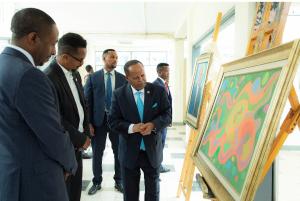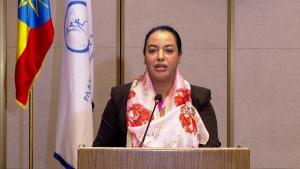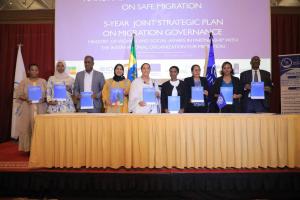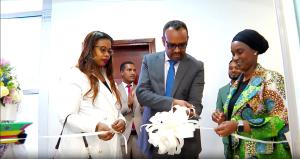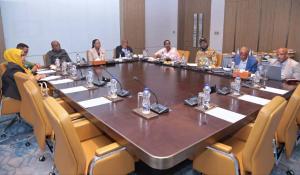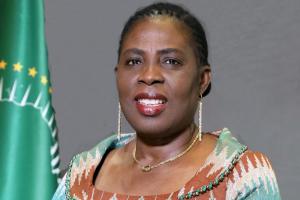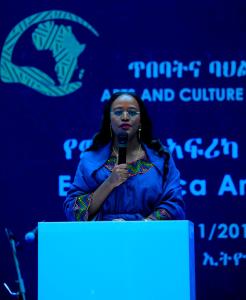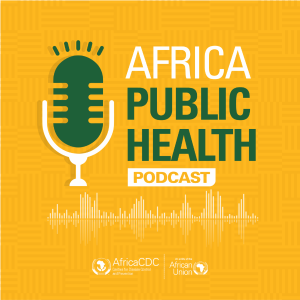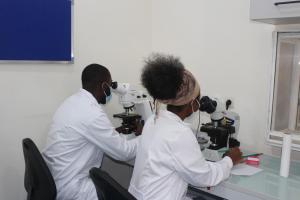Social - ENA English
Social
Adey Ababa International Stadium Phase II Construction Contract Signed
Mar 31, 2025 1187
Addis Ababa, March 31, 2025 (ENA) -- A contract agreement for the completion of the Adey Ababa International Stadium Phase II Lot 2 remaining works was signed today between Ethiopia's Ministry of Culture and Sports and China Communications Construction Company LTD (CCCC). Minister of Culture and Sports, Shewit Shanka, and Xin Bin, Deputy General Manager of CCCC has signed the contract today in Addis Ababa for the construction of the remaining works of Adey Abeba stadium. Minister Shewit, during her address, highlighted the progress made in sports development over the past seven years. She emphasized that the contract agreement is a crucial step towards finalizing the Adey Abeba International Stadium project. "Through the diplomatic efforts of the Prime Minister, we secured 57 million USD from the Abu Dhabi government seven years ago, which has enabled significant advancement in Phase II Lot 1 construction," Shewit stated. The contract, valued nearly at 139 million USD, will facilitate the continuation of construction for Phase II Lots 2 and 3. Upon completion, the stadium is designed to meet international standards set by CAF and FIFA, allowing it to host major international sporting events. " This agreement marks a significant victory for the development of sports in Ethiopia," Minister Shewit added. Xin Bin, Deputy General Manager of CCCC, expressed his company's commitment to delivering the project on schedule. "With over 20 years of experience in Ethiopia, we recognize the importance of this world-class project. We pledge to utilize our resources and expertise to ensure its timely completion," he said. General Manager of MH Engineering and advisor of the project, Mesele Haile, provided detailed insights into the project's scope. He detailed the scope of work left to complete, including; finishing work left over from phase 1, and the very complex roof construction, which carries a large percentage of the current budget. The stadium's total ground area, and facility specifications will enable it to comply with world athletic standards. It is expected that the stadium will be completed within two years. According to him, the stadium is a world class venue that meets any standards including FIFA,CAF and World Athletics. The project includes Phase 2, Lots 2 and 3, encompassing FIFA-grade roofing, cutting-edge technology installations, and premium spectator seating. The completed stadium will feature 1,200 restrooms, 800 handwashing stations, comprehensive field work, and advanced roofing and technology systems. The completion of the Adey Ababa International Stadium is expected to create a prominent venue for sports and entertainment within Ethiopia, contributing significantly to the nation's sporting landscape.
Experts Urge Faster Ratification of AU Free Movement Protocol
Mar 31, 2025 832
Addis Ababa, March 31, 2025 (ENA) ---- Government officials, migration experts, diaspora representatives, private sector actors, civil society, and youth leaders gathered in Mombasa to press for concrete progress on ratifying the African Union’s Free Movement of Persons Protocol. The two-day meeting, jointly convened by the UN Economic Commission for Africa (ECA) and the African Union Commission (AUC), brought together stakeholders to review and validate a report titled Enhancing Free Movement of Persons and Pathways for Labour Mobility and Skills Portability in Ghana, Kenya, and Zambia. The project forms part of a wider effort to reshape the narrative around migration in Africa and remove existing mobility barriers, with funding support from the Government of Italy. “This report stems from a joint ECA-AUC effort launched in 2023 to challenge the dominant crisis-driven narrative around African migration,” said Francis Ikome, Chief of the Regional Integration Section at ECA. “Globally, migration is often viewed as a problem. But within Africa, it is a driver of opportunity.” Referencing ECOWAS, Ikome noted that “even with recent setbacks in the Sahel region, ECOWAS has demonstrated how integration can work, not just in the movement of goods, but of people. It proves that concerns about free movement, while legitimate, should not stall progress.” Head of Humanitarian Affairs at the AUC, Rita Amukhobu echoed the message, highlighting that lessons from regional blocs are informing AU’s work. “We continue to rely on regional communities as building blocks. They’ve walked this path before. We’re counting on countries like those featured in this report - Ghana, Kenya, and Zambia - to lead by example,” she said. Amukhobu emphasized that the AUC “continues to work hand in hand with member states and with ECA, our strong partner, toward getting this protocol ratified.” Simon Asare of the Ghana Immigration Service pointed to real-world experience: “ECOWAS has already moved beyond entry rights to include residence and establishment. Nationals from the region are living and working freely in Ghana. Some even receive citizenship.” The workshop took place as Ghana rolls out visa-free entry for all African nationals, Kenya implements a new e-Travel Authorization (ETA) system, and Zambia expands its visa liberalization measures. All three countries have signed the AfCFTA and are developing strategies to align trade and mobility frameworks. Ikome stressed the symbolic weight of progress by these three countries: “If Ghana, Kenya, and Zambia take these steps, they could serve as powerful accelerators. These nations are not only strategically placed but carry deep historical significance. Their founding fathers were champions of Pan-Africanism and the integration agenda. Their leadership today can inspire a continent-wide shift.”
Nationwide Celebrations Mark 1446th Eid al-Fitr in Ethiopia
Mar 30, 2025 1648
Addis Ababa, March 30, 2025 (ENA)—Muslims across Ethiopia are joyously celebrating the 1446th Eid al-Fitr with prayers, religious ceremonies, and expressions of unity, marking the end of the holy month of Ramadan. In the capital, Addis Ababa, thousands of worshippers gathered early at the iconic Addis Ababa Stadium for the Eid prayers. The stadium was filled with a peaceful and festive atmosphere as Muslims of all ages prayed together, embodying the values of Ramadan that includes fasting, mercy, charity, and compassion. Participants whom ENA approached shared heartfelt reflections on the lessons learned during Ramadan, recounting stories of community support and reaffirming their commitment to helping the vulnerable during the Eid. In Jinka city of Southern Ethiopia region, a large gathering took place at the former airport, uniting local worshippers and dignitaries. Arba Minch celebrated at the Ersamo Memorial Stadium, while Hosanna hosted a major event at its own stadium. In Hosanna, Imam Girma Muzei, Chief Chairman of the Hadiya Zone Islamic Affairs High Council, led the prayers and participated in the community's celebration. The Amhara region also celebrated Eid al-Fitr with a strong sense of unity. In Bahir Dar, Sheikh Jawhar Mohammed, President of the Regional Islamic Affairs High Council, joined other religious leaders and citizens for the occasion. Gondar's Fasilides Stadium hosted a packed celebration, with the city's first deputy mayor in attendance. Dessie and Woldiya also held celebrations, showcasing widespread Muslim participation in the region. In the eastern and southern regions, Harar’s Imam Ahmed Stadium hosted early Eid celebrations, with local Islamic leaders and worshippers joining in. In Dire Dawa, the Eid field saw prayers attended by the Deputy Mayor and other officials, emphasizing the city’s focus on community. Semera and Logia also hosted regional leaders, including Afar Regional State Chief Administrator Awel Arba, who took part in the celebrations, reinforcing the message of national unity. Jigjiga, Gambella, and Jimma also held vibrant Eid celebrations. This year’s Eid al-Fitr in Ethiopia served as a powerful reminder of community, unity, and compassion.
Eid Mubarak 2025: Muslims around the World Celebrating Eid al Fitr
Mar 30, 2025 2554
Addis Ababa, March 30, 2025 (ENA)—Muslims around the world are bidding farewell to the Islamic holy month of Ramadan and have started celebrating the holiday of Eid al-Fitr. Ethiopian Muslims across the country are also celebrating Eid al-Fitr, marking the end of Ramadan. Eid is typically greeted with joy and excitement and is marked with congregational prayers and festivities that usually include family visits, gatherings, outings and new clothes. With the sighting of the new moon in Saudi Arabia and neighbouring countries yesterday, the first day of Eid is being celebrated today 30th March 2025. Other countries follow their own moon sightings, and those that began fasting on March 2 will announce tomorrow night whether Eid will fall on Monday, March 31. Eid al-Fitr, the “festival of breaking the fast”, is celebrated at the end of the fasting month of Ramadan by Muslims worldwide. There are about 1.9 billion Muslims worldwide, approximately 25 percent of the world’s population. Indonesia has the world’s highest Muslim population, with some 240 million Muslims living in the country. Pakistan is second with about 225 million Muslims, followed by India (211 million), Bangladesh (155 million), and Nigeria (111 million). Traditionally, Eid is celebrated for three days as an official holiday in Muslim-majority countries. However, the number of holiday days varies by country. Muslims begin Eid celebrations by attending a prayer service shortly after dawn, followed by a short sermon. The day is spent visiting relatives and neighbours, accepting sweets and extending Eid greetings as they move around from house to house. The most popular greeting is “Eid mubarak” (Blessed Eid) or “Eid sa’id” (Happy Eid). Eid greetings also vary depending on the country and language. When is #Eid al Fitr? Islam follows a lunar calendar and so Ramadan and Eid cycle through the seasons. This year, the first day of Eid al-Fitr is expected to be on or around March 30; the exact date may vary among countries and Muslim communities. What are some common Eid #greetings? Eid Mubarak, or Blessed Eid, and Happy Eid.
Ethiopian Muslims celebrate 1446th Eid al Fitr
Mar 30, 2025 1117
Addis Ababa, March 30, 2025 (ENA)—Ethiopian Muslims across the country are celebrating Eid al-Fitr, marking the end of Ramadan. Muslims also in large numbers marched to Addis Ababa Stadium with gatherings, prayers, and celebrations in places like Addis Ababa Stadium, as well as visiting loved ones and sharing meals. The President of the Ethiopian Islamic Affairs Supreme Council, Sheikh Haji Ibrahim Tufa, and many other religious fathers, members of the diplomatic community, and other invited guests are attending the morning prayers. Eid al-Fitr is a religious holiday celebrated by Muslims worldwide that marks the end of the month-long fasting of Ramadan. Following the holiday, Prime Minister Abiy Ahmed, Deputy Prime Minister Temesgen Tiruneh and other high-level government officials have conveyed their Eid al-Fitr greetings to the Muslim community on the occasion of theEid al-Fitr celebration. In his message, the Prime Minister Abiy highlighted the significance of Eid al-Fitr to strengthen brotherhood and sisterhood among the community.
PM Abiy Extends Best Wishes to Muslims
Mar 29, 2025 1087
Addis Ababa, March 29, 2025 (ENA)—Prime Minister Abiy Ahmed has extended his best wishes to all Muslims on the celebration of 1446th Eid al-Fitr tomorrow. In his message in connection with the holiday, the premier described Eid al-Fitr as a festival of thanksgiving, charity, and brotherhood/sisterhood. The PM explained that brotherhood/sisterhood is a friendship based on shared values, cooperation, and common goals. This friendship is based on morality, love, and mutual support; and it assumes shared responsibility. It is the most important, yet most forgotten value in the political life of our country, Abiy stressed. According to the Premier, fasting is useful to come and exercise self-control. The PM noted that all will benefit if the national dialogue embodies this value. "Just talking is not useful. Letting go of emotion; being calm; looking to the future and discussing is crucial. In this case, like Eid, the end of our dialogue will be gratitude." Writing about the other value of Eid, he pointed out that Eid al-Fitr is about charity. Doing good deeds for the needy; helping people irrespective of kinship, ethnicity, or faith are essential. The meaning of fasting is complete when charity is added to it, he underscored. For him, charity is a very important value for continuing as a country and for building a nation. Prime Minister Abiy finally called on all to celebrate Eid by reflecting on, developing, and using the values for nation-building.
Ethiopia’s Former Deputy PM Participating in Nutrition for Growth Paris 2025 Summit
Mar 29, 2025 1064
Addis Ababa, March 29, 2025 (ENA)—As the founder of the African Leaders for Nutrition Champion and Chairperson of the Board of YADAM Foundation, Demeke Mekonnen, former Deputy Prime Minister and Foreign Minister of Ethiopia, participated in the main and side events of Nutrition for Growth (N4G) Paris 2025 Summit. The Summit was held in Paris from March 26-28, 2025, it was indicated. In the side event showcasing the progress of the SEQOTA Declaration from the N4G Summit in Tokyo to Paris, Demeke highlighted the importance of tackling stunting among children under two years at its roots so as to unlock the immense human potential and foster productive citizens of Africa. He also reiterated the YADAM Foundation's steadfast commitment to contributing to the N4G goals by advocating for nutrition to become a priority among political decision-makers, financers, and donors. On the margins of the N4G summit, Demeke met with various dignitaries and international partners including the African Union Nutrition Champion HM Letsie III, King of Lesotho and UN Assistance Secretary-General for the Scaling Up Nutrition (SUN), Afshan Kahn.
Myanmar Earthquake Death Toll Soars over 1,000
Mar 29, 2025 506
Addis Ababa, March 29, 2025 (ENA)—The death toll from a powerful 7.7 magnitude earthquake in Myanmar jumped to over 1,000 on Saturday as Thailand searches for trapped workers. In neighbouring Thailand, at least nine were killed and up to 100 workers still unaccounted for after a Bangkok, Thailand’s capital skyscraper under construction collapsed. Foreign rescue teams began flying into Myanmar today to aid the search for survivors from an earthquake that killed more than thousands people in the Southeast Asian nation. At least 1,002 people were killed and nearly 2,376 injured in Myanmar’s Mandalay region – the country’s second-largest city and close to the epicentre of the quake – the country’s military government said in a statement on Saturday. In the Thai capital Bangkok – located 1,000km (620 miles) from the epicentre in Myanmar – about 10 more deaths have been confirmed. “Infrastructure such as roads, bridges, and buildings were affected, leading to casualties and injuries among civilians. Search and rescue operations are currently being carried out in the affected areas,” Myanmar’s military said in the statement, which raised the death toll sharply from a previously reported 144 deaths. The shallow 7.7-magnitude quake struck northwest of the city of Sagaing in central Myanmar in the early afternoon on Friday, followed minutes later by a 6.7-magnitude aftershock.
Sidama New Year among Ethiopia’s Cultural Heritages of National Pride with Global Recognition
Mar 28, 2025 657
Addis Ababa, March 28, 2025 (ENA)— Ethiopia's cultural heritages, including the Sidama New Year Fichee-Chambalaalla, are sources of national pride that have achieved global recognition, Tourism Minister Selamawit Kassa said. Speaking at the Fichee-Chambalaalla Festival today, the minister underscored the significance of Ethiopia’s rich and diverse cultures which continue to captivate the world. Fichee-Chambalaalla is a New Year festival being celebrated among the Sidama people of Ethiopia. It is listed as Intangible Cultural Heritage of Humanity by UNESCO. These cultural heritages serve as a powerful foundation for both economic and cultural growth, the minister noted, emphasizing that the Fichee-Chambalaalla event embodies core values of peace, love, unity, solidarity, and brotherhood, Selamawit elaborated. She further stressed the need to promote such cultural events as major tourist attractions in order to increase their global visibility and economic potential. Reaffirming the government’s commitment to preserving cultural heritages, the minister expressed plans to collaborate with regional authorities in identifying, protecting, and developing tourism resources in Sidama. Culture and Sports State Minister Nefisa Almahadi stressed the importance of preserving the cultural essence of Fichee-Chambalaalla, noting its role in fostering justice, good governance, social cohesion, and peaceful coexistence. The Sidama New Year, Fichee-Chambalaalla was celebrated today in Hawassa, Soressa, and Gudumale in the presence of senior federal officials, representatives from neighboring zones, and community members.
Investment Commission, Ethiopian News Agency Ink Memorandum of Understanding
Mar 27, 2025 819
Addis Ababa, March 27, 2025 (ENA)—The Ethiopian Investment Commission and the Ethiopian News Agency have signed a Memorandum of Understanding (MoU) that enhances the country's foreign investment potentials. Ethiopian Investment Commissioner Zeleke Temesgen and Ethiopian News Agency CEO Seife Derbie signed the MoU today. The commissioner said on the occasion that the commission has been playing a significant role in leading Ethiopia's economic transformation and promoting investment. The government has undertaken numerous actions to create a favorable environment for investment, he elaborated, adding that efforts are underway to support and monitor investment projects that have started operations in various sectors. All these efforts require media partnership and promotion to tap the immense investment potential of the country, he added. Accordingly, Zeleke noted that the partnering of the commission with ENA, the oldest news agency that distributes reliable and accurate news stories, is important in promoting Ethiopia’s immense investment opportunities. On his part, Ethiopian News Agency CEO Seife Derbie stressed that the partnership signed with the commission comes at a moment when the agency is expanding its reach and partnership in Ethiopia, Africa, and beyond. With 40 branches across Ethiopia, the Ethiopian News Agency distributes news and news related contents in 8 local and international languages, he noted. The CEO added that the agreement is a great opportunity for the news agency to promote investment opportunities in the country and to work together with the commission in realizing the ambition to make Ethiopia an investment hub. ENA will also use its BRICS media membership presidium to promote national issues to broader outreach.
Prez Taye Says Fine Arts, Music Vital for Nation’s Cultural Vibrancy
Mar 27, 2025 593
Addis Ababa, March 27, 2025 (ENA)—President Taye Atske Selassie has praised the vital roles that have been played by Alle School of Fine Arts and Design and the Yared School of Music in enhancing the cultural vibrancy of Ethiopia. Accompanied by Addis Ababa University Interim President Samuel Kifle, President Taye visited the schools under the Addis Ababa University. After the visit, President Taye said the schools are invaluable assets in fostering Ethiopia’s creative talents and enhancing cultural and artistic development. He also stressed the importance of fine arts and music education in safeguarding Ethiopia's rich traditions while encouraging continued exploration of artistic talents. Reiterating his commitment to supporting the advancement of fine arts and music, the president stated that the arts are integral to the nation's growth and development, encouraging the schools to continue in their efforts to enrich Ethiopia's cultural landscape. On his part, Addis Ababa University Interim President Samuel Kifle stated that President Taye's visit underscores the government's dedication to advancing fine arts and music education. Such engagements promote the schools and strengthen collaboration between the government and educational institutions, he added. Samuel said the visit marked a pivotal moment in reinforcing and nurturing the arts for the future of Ethiopia.
Ethiopia to Convene Pan African Youth Leadership Summit
Mar 27, 2025 851
Addis Ababa, March 27, 2025 (POA) --- The Pan African youth leadership Summit will be held in Addis Ababa from 3-5 April 2025 under the theme "Unlocking the power of youth for prosperous Africa", according to Ministry of Women and Social Affairs. Briefing the media today, Ethiopia’s Minister of Women and Social Affairs Ergoge Tesfaye said the summit aims to enhance the participation of African youths in the effort to build prosperous and sustainable peace of Africa. Preparation is underway to hold a successful summit in collaboration with African Union and other pertinent bodies, she said. According to the minister, the summit would play a significant role in fostering pan-Africanism among African youths. The summit will deliberate on various issues to empower African youths such as diplomacy and to enable them safeguard the interests of Africa in the international arena. Noting Africa has large youth population, she underscored that empowering youths to actively participate in economic and political issues would foster the effort to build the Africa we want. The summit will be held at Adwa Victory Memorial Museum and bring some 1000 participants together. On the side of the event, start up exhibition and cultural exchange, among others, will also be held, the minister said.
Ethiopia Launches Nat’l Communication Strategy, Joint Strategic Plan to Promote Safe Migration
Mar 26, 2025 1038
Addis Ababa, March 26, 2025 (ENA)—The government of Ethiopia has launched the National Communication Strategy and Joint Strategic Plan between International Organization for Migration (IOM) to promote safe migration as well as deliver on effective migration governance. During the launch of the communication strategy and joint strategic plan for five years (2025-2029), Minister of Women and Social Affairs Ergogie Tesfaye said the Ethiopian government remains resolute in addressing the challenge of migration. Ethiopia always reaffirms its commitment to combating irregular migration and promoting safe, dignified and lawful migration for all, she pointed out. For the minister, the launching of a five-year joint strategic plan on migration and communication strategy on irregular migration and promotion of safe migration mark a pivotal moment in the efforts of migration governance. IOM Ethiopia Chief of Mission Abibatou Wane on her part said that irregular migration is a pressing issue that has affected many countries including Ethiopia. Irregular migration leads to numerous challenges, including exploitation, human trafficking and the loss of lives. The launch of the documents marks a milestone in Ethiopia's migration governance journey, the chief of mission noted. It also reaffirms the collective commitment to unlocking the potential of migration, expanding regular pathways and reducing irregular migration, Wane added.
Ethiopia Launches Human Trafficking Hotline
Mar 25, 2025 632
Addis Ababa, 25, 2025 (ENA)— The first national anti-trafficking hotline was launched in Ethiopia today. The hotline initiated by the International Organization for Migration was supported financially by the US Department of State and the European Union, alongside several government entities like Ethio telecom, it was learned. During the launching ceremony, IOM Ethiopia Chief of Mission Abibatou Wane Fall said individuals will be connected to trained professionals who can provide confidential assistance, connect them to shelters, legal aid, and medical care, and ensure that their cases are handled with the urgency and sensitivity they deserve by dialing 8797. The hotline will also serve in Amharic, Afan Oromo,Tigrigna and English; and address corrupt practices that aid trafficking, marking a significant advancement in Ethiopia's fight against this issue. The chief added that those affected require comprehensive support, starting with timely identification and referral to specialized services, and this national hotline will help prevent trafficking and risky migration, protect victims, and support prosecution efforts. According to her, the hotline is a significant step the Ethiopian government has created to fight human trafficking. It aims to assist victims and help authorities dismantle trafficking networks. The hotline serves as a lifeline for victims, hope for survivors, and a vital tool in combating human trafficking, offering safety and support, Wane Fall elaborated. "Human trafficking is a global crisis, and Ethiopia is not immune. Each day, people are tricked, coerced, or forced into exploitative labor, prostitution, sexual exploitation, domestic servitude, forced criminality, and debt bondage --- stripped of their fundamental human rights." This effort is part of broader initiatives by the Ethiopian government, along with international organizations and civil society, to strengthen anti-trafficking strategies, the chief revealed. Key aspects include training for officials on victim protection, improving legal actions against traffickers, raising awareness about trafficking dangers, and collaborating with groups like IOM. Justice State Minister Belayhun Yirga said on his part that the government is consistently working to develop a comprehensive policy, legal and institutional framework while enhancing coordination mechanisms to promote and strengthen regular migration, and to prevent and control irregular migration. The government, he added, is implementing large-scale economic and social programs with a specific focus on the primary push factors of migration; and several activities are being conducted to expand domestic employment opportunities, strengthen foreign employment, enhance community awareness, improve border management, and bolster law enforcement capacity. The state minister pointed out that the hotline seeks to enhance law enforcement efficacy by supplying victims, vulnerable individuals, and the broader community with information regarding human trafficking and smuggling. Finally, Belayhun encouraged the public to make use of the hotline to report any suspected incidents, stressing that collective action is vital in safeguarding vulnerable individuals.
East African Ministers Reach Historic Agreement to Boost Culture & Creative Industry
Mar 25, 2025 705
Addis Ababa, March 25, 2025 (ENA) --- East African ministers responsible for arts and culture have reached what many are describing as an historic agreement to collaborate on the advancement of the region’s cultural and creative industries. The decision follows a productive meeting held at the East Africa Arts and Cultural Festival in Ethiopia’ s capital, Addis Ababa. According to reports, the ministers have pledged their commitment to strengthening cooperation in promoting and developing East African art and culture. They agreed to establish a framework for joint initiatives and projects aimed at facilitating the exchange of ideas, expertise, and best practices among member states. The agreement seeks to bolster the region’s cultural sector, preserve cultural diversity, and enhance the visibility of East African heritage on the global stage. As part of this initiative, a working document will be released in the coming weeks, outlining key areas of collaboration. These include; the preservation of heritage sites, promotion of cultural tourism, and support for creative industries such as music, film, literature, and visual arts. The document will serve as a strategic guide for cultural stakeholders, providing a roadmap for implementing the ministers’ commitments. By promoting regional integration and cooperation, the leaders hope to unlock the full potential of East Africa’s creative economy, drive economic growth, and provide more opportunities for artists and cultural entrepreneurs. Participating countries include Ethiopia, Rwanda, Burundi, Djibouti, Uganda, South Sudan, Tanzania, Somalia, the Democratic Republic of Congo, and Kenya. The officials have assured stakeholders of continuous updates on the progress of this initiative and have called for active engagement from cultural institutions, artists, and the wider public.
Achieving Agenda 2063 Requires Strong Political Will, Increased Domestic Financing
Mar 25, 2025 666
Addis Ababa, March 25, 2025 (ENA) ---- Achieving Africa’s vision for a self-reliant and prosperous continent, as outlined in the African Union Agenda 2063, requires strong political will, increased domestic financing and the integration of TB services into broader national health and social protection frameworks, African Union Commission urged. Commissioner for Health, Humanitarian Affairs and Social Development, at the African Union Commission, Ambassador Amma A. Twum-Amoah made this remark in her official statement on World Tuberculosis Day. World Tuberculosis Day marked across the globe under the theme: “Yes! We Can End TB: Commit, Invest, and Deliver.” The Commissioner reaffirmed AU’s commitment to ending tuberculosis (TB) in Africa and ensuring that combatting this preventable and curable disease remains a continental priority jointly with the AU member states and partners globally. This year’s theme serves as a call to action for bold leadership, sustained investments and concrete actions to eliminate TB, particularly among the most vulnerable populations. Despite the progress made, TB remains one of Africa’s deadliest infectious diseases, disproportionately affecting women, youth and marginalised communities, she revealed. “Thus, more remains to be done to close gaps in diagnosis, treatment and prevention. Emerging challenges such as drug-resistant TB, fragile health systems and humanitarian crises undermines our efforts to meet global and continental TB targets,” AU Commissioner underlined. The Africa Health Strategy (2016–2030) and the AU Roadmap to 2030 and Beyond: Sustaining the AIDS Response, Ensuring Systems Strengthening and Health Security for the Development of Africa provides a strategic framework for addressing TB. The AU and its member states remain steadfast in ensuring that no one is left behind in the fight against infectious diseases through the Catalytic Framework to End AIDS, TB and Malaria by 2030. “Achieving our vision for a self-reliant and prosperous Africa, as outlined in AU Agenda 2063: The Africa We Want, requires strong political will, increased domestic financing and the integration of TB services into broader national health and social protection frameworks,” ambassador Amma A. Twum-Amoah underscored. She also stresses the importance of strengthening collaborations with civil society, traditional leaders and the media top ensure that TB messages reach the most remote communities. The 2025 AU Theme of the Year on Reparations serves as a reminder that reparative justice is essential in addressing the structural inequities that perpetuate the disease burden in Africa, according to ambassador Amma A. Twum-Amoah. Furthermore, the operationalisation of the African Medicines Agency (AMA) presents a unique opportunity to strengthen Africa’s health security by facilitating the development, regulation and accessibility of new diagnostic tools, efficacious medicines and treatment options for TB and other infectious diseases towards improving access to life-saving interventions across the continent. “The fight against TB is a collective responsibility and as we observe World TB Day, let this be a moment of a call to action for renewed commitment, increased investments and the tangible delivery of TB services that prioritise the most vulnerable.” She expressed AU’s readiness to remain resolute in translating our commitments into action, working alongside member states, partners and communities to achieve a future free from the burden of TB.
East Africa Arts, Culture Festival Concluded Successfully: Minister
Mar 24, 2025 875
Addis Ababa, March 24, 2025 (ENA)-- The three-day East Africa Arts and Culture Festival, themed "Art and Culture for Regional Integration," concluded successfully at the Addis Ababa International Convention Centre yesterday evening. Minister of Culture and Sports, Shewit Shanka, highlighted the festival's role in fostering regional cohesion and unity. The event featured vibrant performances from various countries in the region including Ethiopia, Djibouti, Somalia, Rwanda, Tanzania, and Burundi, showcasing diverse artistic expressions including music, dance, circus acts, and fashion shows, among others. Minister Shewit emphasized Ethiopia's successful presentation of its rich cultural heritage, both ancient and contemporary. This festival was successful in the fact that arts and culture crucial links to create unity among the peoples of East Africa and accelerate integration, she observed. "The festival showcased Ethiopia's traditional clothing, arts, and other products. Through this, Ethiopia introduced its rich cultural and artistic outputs to neighboring countries. It has demonstrated the role of culture and arts in fostering people's connection, unity, and coexistence." The minister reaffirmed that Ethiopia is committed to hosting the festival regularly. She also mentioned consultation with regional ministers resulting in reaching consensus to collaborate on future cultural events tailored to their respective national interests.
Africa CDC Launches New Podcast to Drive Health Impact Across the Continent
Mar 24, 2025 564
Addis Ababa, March 24, 2025 (ENA) ---- The Africa Centres for Disease Control and Prevention (Africa CDC) has launched the Africa Public Health Podcast, a powerful platform designed to elevate African voices in public health, tackle misinformation, and drive resilience to the continent's evolving health challenges. As the continent navigates a burdened landscape of health threats - from pandemics and climate-related risks to non-communicable diseases - Africa CDC remains steadfast in its mission to empower through science-driven, accessible, and timely information. In this evolving health ecosystem, the Africa Public Health Podcast aims to ignite critical conversations, spark innovation and reshape how public health stories are told across the continent. "At Africa CDC, we believe in the power of storytelling to inspire action and trust," said Margaret Muigai-Edwin, Director Communication and Public Information at Africa CDC. "The podcast gives Africa its own microphone where our experts, frontline workers and communities can shape the narrative of public health in Africa." The podcast will feature a series of expert interviews, frontline experiences, and community-led solutions, highlighting Africa's unique strategies in advancing health security and innovation. Episodes will explore pivotal themes such as pathogen genomics, pandemic preparedness, digital health, community engagement, science and innovation as well as capacity building and training to strengthen Africa's health systems. The premiere episode, "The Power of Genomics in Disease Control," features Dr Sofonias Tessema, Program Lead for Pathogen Genomics at Africa CDC, in conversation with host Andisiwe Michelle May. Together they unpack how genomic technology is transforming outbreak detection across Africa- from scaling sequencing capacity in over 40+ countries to applying AI in tracking diseases like malaria, Ebola and cholera. The episode offers a compelling look at how Africa-led innovation is shaping the future of disease surveillance globally. "Our goal is to demystify complex public health issues and make them relatable to everyday Africans," added Edwin. "This podcast is part of our broader commitment to building a well informed and health empowered continent."
Pope Francis Discharged from Hospital after Treatment for Respiratory Infection
Mar 23, 2025 653
Addis Ababa, March 23, 2025 (ENA)— Pope Francis was discharged from Rome's Gemelli hospital Sunday, five weeks after he was admitted for a case of bronchitis and later suffered other medical complications, including pneumonia in both lungs. The 88-year-old pope, who also made his first public appearance since February 14 before being discharged from Rome's Gemelli hospital, left the facility shortly after noon. Appearing weak but in good spirits, the pope briefly greeted hundreds of faithful from a hospital balcony Sunday morning before leaving the facility, his first public appearance since going in for treatment in mid-February. "I see a woman with yellow flowers. Brava!" he said, his voice subdued. The crowd erupted in chants of "Viva il papa!" and "Papa Francesco," celebrating his remarkable recovery after an illness that left him hospitalized for weeks. "It's emotional to again find the hope that the pope brings," said Rome resident Giulia Gianarelli. The Vatican said Francis left the hospital in his white Fiat 500L and headed to the Basilica of Saint Mary Major to pray. He was expected to return to his home at Casa Santa Marta, where doctors said he would need to convalesce for two months, resting and receiving additional medical treatment. Francis was admitted to Gemelli hospital on 14th February 2025 for a case bronchitis and was diagnosed with a severe respiratory infection, the most serious health crisis of his 12-year papacy. In the ensuing days, Francis was also diagnosed with a "polymicrobial infection" of his respiratory tract as well as bilateral pneumonia. The pope was in critical condition for part of his hospitalization, and doctors said he also suffered two "critical episodes" during which his life was in danger. Francis was given oxygen therapy and at one point he was placed on a non-invasive ventilator, according to medical staff. The pope was briefly hospitalized in 2023 for a separate case of bronchitis. In his twenties, doctors removed part of his right lung to treat an infection. Dr. Sergio Alfieri, a Gemelli hospital physician who led the pope's medical team, said Francis would need time for a full recovery from the bilateral pneumonia. Doctors said they also expect the pope's voice, which was frail on Sunday from time spent on oxygen therapy, to gradually recover. Alfieri told reporters Saturday evening that he hoped the pope's improving health meant that Francis could soon resume a work schedule, though he may not be able to attend meetings with people and groups right away.
African Region Records further Decline in Tuberculosis (TB) Deaths, Cases
Mar 23, 2025 666
Addis Ababa, March 23, 2025 (ENA)— The African region has recorded the steepest decline globally in tuberculosis (TB) deaths since 2015, despite falling short of key milestones to significantly lower the burden of the disease and end its toll on health and lives. Deaths from TB fell by 42% between 2015 and 2023 while cases declined by 24% over the same period, according to the World Health Organization (WHO) Global TB Report 2024. The reductions were mainly due to increased efforts by countries to reinforce case detection and provision of treatment, thus averting deaths. About 1.9 million cases were detected in 2023 compared with 1.4 million in 2020. Over the same period, treatment coverage rose from 55% to 74% across the region. This year, World TB Day is being marked under the theme “Yes! We Can End TB: Commit, Invest, Deliver”, which calls for urgent action to turn commitments into tangible impact. It emphasizes the need for strong investment and decisive measures to scale up WHO-recommended interventions for early detection, diagnosis, preventive treatment and high-quality TB care. The WHO End TB Strategy calls for countries to reduce TB deaths and cases by 75% and 50% respectively by 2025, compared with 2015 levels. Several African countries have made notable progress. South Africa achieved a 50% reduction in TB incidence between 2015 and 2023, becoming the first country in the region to surpass the 2025 milestone ahead of schedule. Mozambique, Tanzania, Togo and Zambia have also already met the 2025 goal of a 75% reduction in TB deaths. Other countries, including Kenya, Malawi, Rwanda, Sierra Leone and Uganda are close behind, with mortality reductions of 66% or more. At a subregional level, Eastern and Southern Africa has been the main driver of TB reduction, cutting incidence from 466 to 266 per 100 000 between 2000 and 2023. Progress has been slower in Central and West Africa, where TB incidence and mortality remain a concern. Despite the progress, several challenges still need to be overcome. Limited access to rapid diagnostics, which currently reach only 54% of TB patients, is one of the most pressing issues. While this marks a significant improvement from just 24% in 2015 – nearly doubling coverage in 10 years – access is insufficient to curb the spread of multidrug-resistant TB strains. The burden of MDR-TB persists, with more than half of these cases undiagnosed and untreated in 2023. TB also imposes a severe economic burden. For nearly 68% of TB-affected households in Africa, the cost of seeking treatment is catastrophic. Many families face high out-of-pocket medical expenses, loss of income and inadequate social protection, hindering adherence and full recovery. Low funding continues to impede TB control efforts at national and regional levels. The African region requires US$ 4.5 billion annually for comprehensive TB services, yet only US$ 0.9 billion is currently available, leaving a US$ 3.6-billion gap. Without urgent investment, life-saving interventions will remain out of reach for many. WHO continues to support countries to reinforce TB control and contribute to global efforts against the disease. This includes working with countries to adopt rapid diagnosis and updated treatment guides, in line with the UN High-Level Meeting Political Declaration on TB 2023. To meet the global targets, urgent action is required to close the diagnostic gap, increase funding, and expand access to treatment and prevention.
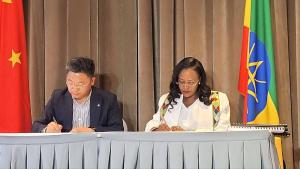
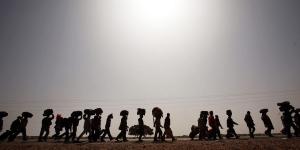



.jpg)
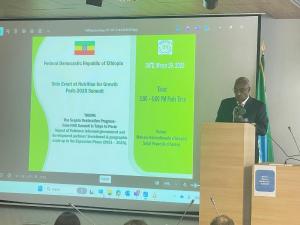


.jpg)
